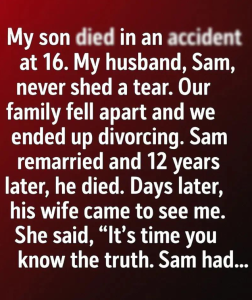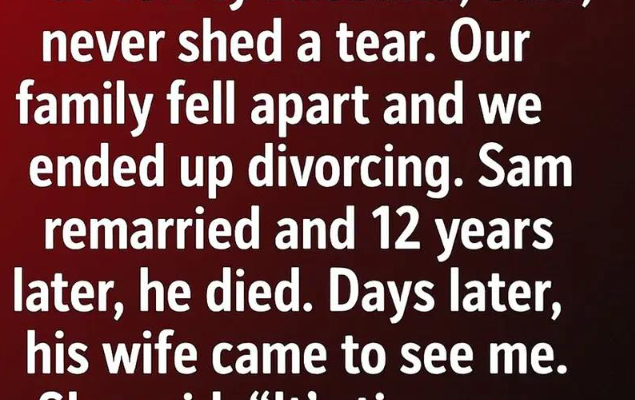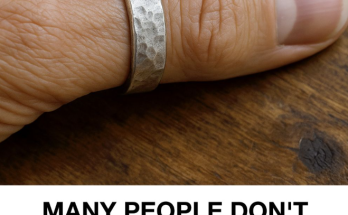
The Letters He Never Shared: A Story of Love, Loss, and Healing
When Evelyn found the box, it was covered in a fine layer of dust—hidden beneath a loose floorboard in her late father’s study. She had come to the house to sort through his belongings, to make sense of the silence he had left behind. He had been a man of few words in life, but the box told her, even before she opened it, that there were many words he’d never spoken.
It was an old wooden chest, small enough to fit in her arms, bound with a tarnished brass clasp. Her hands trembled as she lifted the lid. Inside were dozens of envelopes—yellowed, brittle, tied neatly with a faded blue ribbon. Each one bore the same name written in her father’s familiar, slanted handwriting: “Margaret.”
Her mother’s name.
But her mother had died when Evelyn was three.
Her father had never spoken much about her—only that she was “gone too soon,” and that Evelyn had her smile. Evelyn had grown up filling in the gaps with her own imagination, weaving stories from fragments of family whispers and faded photographs. But now, sitting cross-legged on the floor with that box before her, she realized she might finally learn the truth.
The first letter was dated June 14, 1989, the year her mother died. The ink had faded slightly, but the words were still strong enough to pull her into a life she’d never known.
My dearest Margaret,
They say time will heal, but it hasn’t. The bed feels colder each night. Evelyn asked where you are today. I told her you’re with the stars. She smiled and said she’ll wave to you at bedtime. I think that’s the first time I’ve smiled in weeks.
You should know—our daughter is brave. Braver than I could ever be. I see you in her every day. I wish I could tell you that without this ache in my chest.
Love always,
Henry
Evelyn’s breath caught. Her father had written this not as a diary, but as a love letter to a woman who could no longer read it. She turned the next envelope over in her hands, dated two months later.
August 23, 1989
I dreamt of you again last night. You were sitting by the lake, your hair loose, laughing at something I’d said. I woke up before I could remember the sound of it.
I tried to paint the sky this morning. It looked nothing like the one we saw that summer. I don’t think I’ll ever get the color right. Maybe it’s because it’s the one thing I can’t recreate without you.
He had been an artist once—a painter who filled the house with colors until the day her mother died. After that, his brushes went dry, and silence took their place. Evelyn had never understood why he gave it up. Now she did.
Letter after letter, she read of a man drowning quietly beneath the surface of his grief. Yet, between the pain, there were glimmers of tenderness—memories of family breakfasts, of her mother’s laughter, of the smell of rain-soaked earth after a summer storm.
One letter, written years later, stood out.
December 1, 1997
Evelyn is growing up too fast. She asked me today if you would’ve liked her paintings. I told her you’d have adored them. She laughed and said, “Then I’ll paint the sky for her.”
It struck me how much she is like you—always finding beauty in broken things. I still talk to you, you know. Not out loud, not all the time, but in the quiet moments when she’s asleep. I tell you how hard it is, how proud I am, how I still wish you were here to see her grow.
Tears blurred Evelyn’s vision. She realized these weren’t just letters of grief—they were letters of survival. Her father hadn’t been silent out of indifference. He had been trying to hold on in the only way he knew how.
At the bottom of the box lay one final envelope. It was newer, sealed, and addressed not to Margaret—but to Evelyn. Her hands trembled as she tore it open.
My darling Evelyn,
If you’re reading this, I suppose my silence has finally broken. There are so many things I never said, not because I didn’t want to, but because I didn’t know how.
You once asked me why I never remarried. I told you it was because love like your mother’s only comes once in a lifetime. That was true—but there’s more to it. I stayed because you were the piece of her that stayed with me. You were the reason I kept painting inside my heart, even when the canvas stayed blank.
Every letter in this box was written not just for your mother, but for you—to know the kind of love that built you, the kind of love that endured even after loss.
If I could leave you one piece of wisdom, it’s this: grief doesn’t mean forgetting. It means loving in silence, until love itself teaches you to heal.
Live bravely, my daughter. Paint your skies.
With all my love,
Dad
For a long time, Evelyn didn’t move. She sat surrounded by the ghost of her parents’ love—one that had quietly shaped her entire life without her realizing it.
She rose, carrying the box to the window. Outside, the afternoon light stretched across the garden her father had tended for years. The roses her mother once planted were still blooming, their petals soft and full of color. She smiled through her tears.
That night, Evelyn took out her father’s old easel and brushes from the attic. The scent of turpentine filled the air—a scent she hadn’t smelled since childhood. She placed a blank canvas in front of her and began to paint, each stroke heavy with memory and hope.
She painted the sky—deep blue streaked with the soft pink of dawn. And somewhere between the clouds, she imagined her parents together, watching her, proud.
When she finished, she whispered into the quiet room, “I’ll keep painting for you.”
For the first time in years, Evelyn felt peace—not the absence of grief, but the presence of love that had endured beyond words, beyond time, beyond loss itself.
And in that quiet house, filled with letters once hidden beneath the floor, something sacred had finally been shared.

